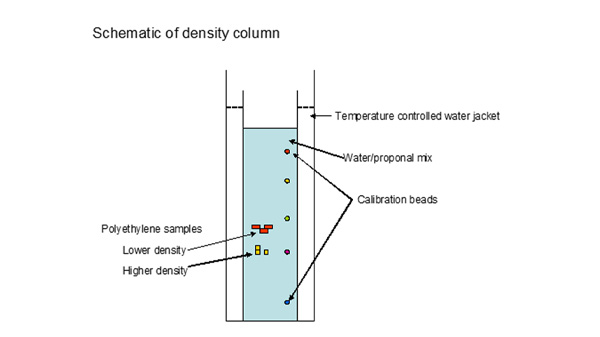Plastic Density is a key physical property for polyethylene and other plastics.
The graduated column is one of several ways of measuring density. Its advantage over other methods is that it can be used to measure the density of a selected location of a polyethylene article. Water and propanol are mixed in such a way as to produce a graduated column, which is held at a constant temperature inside a water jacket. The liquid at the bottom of the column has more water and less propanol and so has a higher density than the liquid at the top.
The proportions of propanol and water can be varied such that the density range for the column is fixed, e.g. 930kg/m3 to 950kg/m3. Glass beads of known density are introduced into the column to provide a calibration. Polyethylene samples are carefully cut from the test item (product, extrudate, sheet, etc.) and dropped into the column. After a fixed period of time, the position of the samples in the column is measured against a graduated scale and compared against the data for the calibrated beads
The sample densities are derived by calculation.
Accredited Plastic Density tests
Impact Solutions are a UKAS accredited testing laboratory No. 0402 which can undertake density measurements to ISO 1183-2 standards. Our accreditation means that our results are accepted as an expert standard and can be used to pursue CE or other markings in conjunction with other testing depending on your specific product.
Dependance of properties – Modulus
The density of polyethylene reflects the relative amounts of amorphous and crystalline material. Totally amorphous material comprises very loosely arranged chains with an approximate density of ~850kg/m3 – it would be very flexible. Crystalline material comprises tightly packed chains with an approximate density of ~1000kg/m3 – It would be very stiff.
Polyethylenes are composites made of crystalline and amorphous material with intermediate densities and intermediate properties. The modulus or stiffness of polyethylene is related directly and almost linearly to its density. This relationship between modulus and density does not appear to be affected by the way in which the density is delivered – either by molecular weight or short chain branching variations.
Click here for more testing solutions from Impact Solutions
Be sure to also follow us on Twitter, Facebook and LinkedIn to stay up-to-date with our services.





